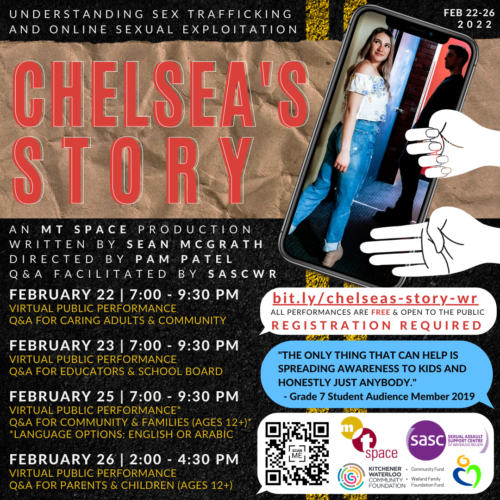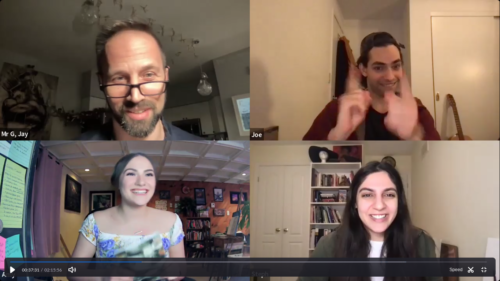Observer: Illustrating the perils of human trafficking
 Illustrating the pervasiveness of human trafficking on stage – or, in this case, virtually – is the goal of Chelsea’s Story. The play mirrors how children and teens can be lured online from their own bedroom.
Illustrating the pervasiveness of human trafficking on stage – or, in this case, virtually – is the goal of Chelsea’s Story. The play mirrors how children and teens can be lured online from their own bedroom.
Click here for more information and registration.
The Waterloo Region Crime Prevention Council (WRCPC), MT Space and Sexual Assault Support Centre of Waterloo Region (SASCWR) partnered for the fourth year to present Chelsea’s Story and bring awareness to exploitation. SASC’s anti-human trafficking program saw a 29 per cent increase in access to supports over the last two years.
“As the community became isolated due to COVID, and everybody moved online, including our use, this just gave exploiters anonymous access, really easy anonymous access into people’s homes through apps and games and the virtual world,” said Nicky Carswell, program coordinator at SASC.
“Chelsea’s Story brings a lot of awareness, and it is perfectly matched for that target audience. The average age of entry into trafficking is 13,” she said. “The bulk of our work is with young folks. So, when you have something like Chelsea’s Story showing how easily and how quickly this can happen in a way that is suitable for that age and really hit that age, that is the best way to build awareness.”
Chelsea’s Story is based on a true story and written to help educate young adults about exploitation and the dangers of human sex trafficking. It centers on three students who find the diary of a young girl named Chelsea, who is being targeted by a man.
“I think what’s really eye opening is how this really could happen to anybody,” said Pam Patel, artistic director at MT Space and director of Chelsea’s Story in the region for the last four years. “We’re trying to make it as realistic a portrayal as possible.
“The characters are very relatable for parents and teenagers, preteens and youth. The characters are basically high school students. We’re trying to also adapt the scripts to keep it up to date with things like Tik Tok references. There’s also a teacher character who I think is a real anchor for the parents in the audience and the teachers in the audience that offers a glimpse into how to talk about human trafficking and consent and exploitation.”
Performances are now underway, running through Saturday online, showcasing the actors’ abilities to stay connected with their audience and other actors over Zoom while emphasizing what human trafficking can look like in a modern setting.

“The audience can connect with Chelsea herself as she goes through this experience of being groomed and being trafficked. But then it can switch to the classroom, where the kids and their teacher are sort of unpacking what it is that’s happening and some other options about where some interventions could perhaps happen,” said Julie Thompson, community engagement coordinator with the Waterloo Region Crime Prevention Council.
“The audience that the play was really intended to reach was that very young audience where they could sort of see themselves or their friends depicted in this throughout parts of the play,” Thompson explained.
The organizations aim to bring awareness to human sex trafficking and prevent further victimization. As it becomes easier for predators to enter a young adult’s bedroom through electronic devices, it’s important for parents to be aware of their child’s online activity, especially as the pandemic has increased isolation and the time youth spend on these devices.
“A piece that’s come up a lot in conversation, especially now, is how exploitation and trafficking can happen without ever having to leave your home. So that’s another piece that we want parents to hear as well: what are those kinds of things they can look out for to ensure that their child is still remaining safe while they’re online,” said Patel.
“The stat is that it’s about 93 per cent of people who are trafficked are girls and women. The average age of recruitment is 13. Locally, they’ve been seeing kids as young as 11 seeking support services,” added Thompson.
Chelsea’s Story is aimed at youth aged 12 and older, educators, parents, and families, a bid to help them notice the signs of human trafficking and exploitation as well as how to intervene. They plan on taking it on a school tour starting in April to help bring more awareness.
This is the first time Patel has directed a play virtually and found the challenging experience allowed them to be creative with their method of filming.
“My approach to directing this was really through that lens of telling the actors ‘let’s not ignore that we’re on Zoom. Let’s actually embrace it and use that.’ So we adapted all of the settings of the show to either being in the Google Classroom or being a FaceTime call. The main character, Chelsea, is meeting this other character through a video chat, so we adapted everything to that,” she explained. “We could be a little more creative – that kind of opened us up to really looking at, ‘OK, now how can we make this really engaging and have the actors actually playing to the camera, which would be their audience?’
“Part of the magic of performing theatre is what happens backstage, like running on and off and having your costume changes. There’s still an element of that because all the actors are playing more than one character. What we’re doing is all of the characters have their own device, so all the actors are using two devices to perform the show – they have a little bit of technical gymnastics they have to do behind the scenes to keep switching back and forth. It’s been really fun, actually.”
More information and registration can be found online.
Click here to read the original article.
